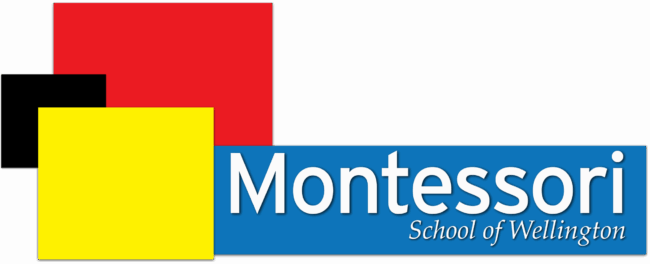10 Montessori Education Benefits for Children That Build a Strong Foundation
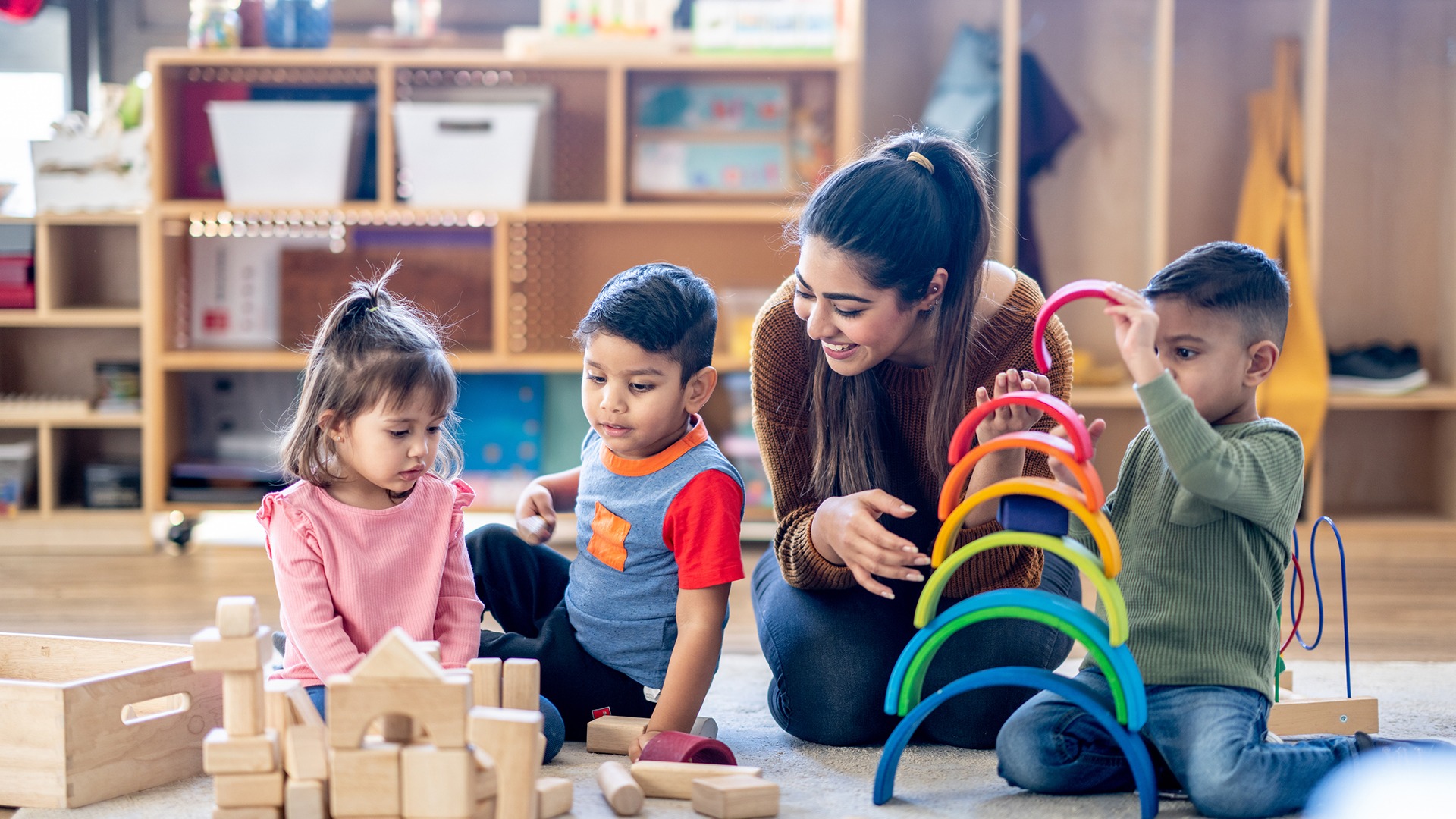
Are you concerned about finding an educational approach that truly nurtures your child's holistic development in a world increasingly dominated by screens?
Many conventional educational settings fall short, focusing primarily on academics while overlooking crucial aspects like independence, social-emotional growth, creativity, and essential real-world skills. This can leave children unprepared for the complexities of life beyond the classroom, potentially hindering their ability to develop patience, resilience, and leadership.
Discover Montessori education, a comprehensive approach that extends far beyond academics. In a hands-on, technology-free environment, children build a strong foundation for lifelong learning and well-rounded development. Research-backed advantages demonstrate how accredited Montessori schools cultivate patience, resilience, and leadership. Mixed-age classes foster empathy and teamwork, while screen-free spaces ignite imagination and concentration. By choosing a family-owned, fully accredited program, you gain a dependable educational solution that ensures your child thrives.
When Traditional Paths Fall Short, Montessori Offers A Different Way

Many parents worry about where to begin when it comes to their child’s early education. You might see classrooms packed with rows of desks and worksheets and wonder whether they help your child truly understand, or if they simply encourage memorization. At home, screens and digital devices can distract from meaningful play. These concerns are valid; early childhood is a critical period for brain development. A learning approach that neglects independence, creativity, and real‑world experience can leave children unprepared for life beyond school.
Parents often choose the Montessori path because they want Montessori education benefits for children that extend beyond academics. Yet it can be hard to sift through marketing claims to see what is authentic. Wellington County has only one fully accredited Montessori school, and the term “Montessori” is unregulated, so anyone can use it. Choosing an unaccredited program risks exposing your child to an inconsistent philosophy that may not deliver the benefits that research has shown.
There is a solution. Authentic Montessori environments like those at the family‑run Montessori School of Wellington, provide consistent structure, hands‑on activities, and experienced guides who respect each child’s pace. Research shows that Montessori education benefits for children include stronger cognitive abilities, social skills, creativity, and academic achievement. Hands‑on learning for preschoolers in Montessori classrooms engages multiple senses, improves retention, and fosters problem‑solving. This pillar guide explains ten advantages of the Montessori approach and shows how choosing an accredited, technology‑free environment can support your child’s growth.
Foster Independent & Self‑Directed Learning
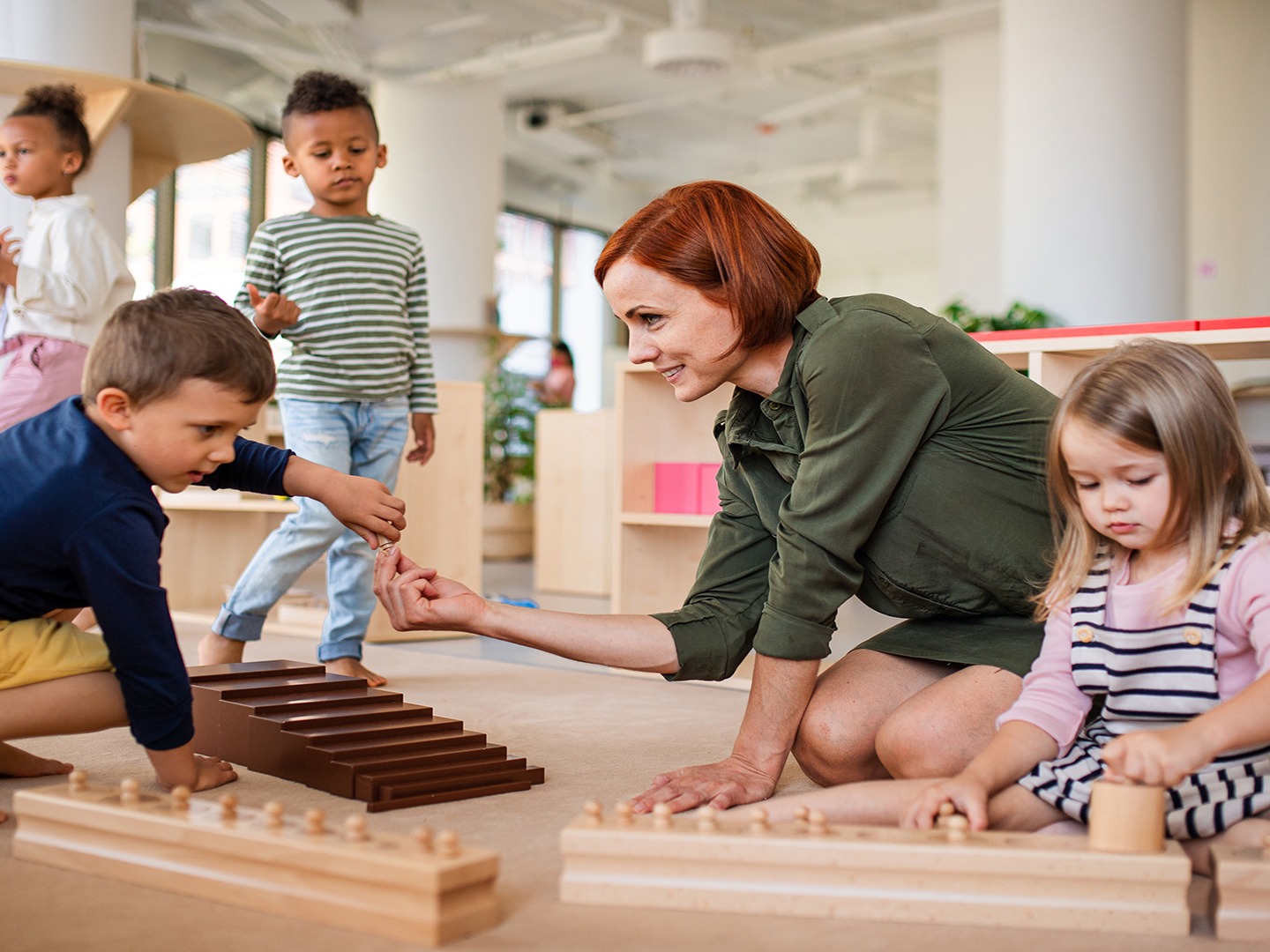
Montessori classrooms are carefully prepared for exploration. Children work with materials designed for their stage of development, and they choose activities that interest them. This is different from traditional teacher‑led instruction, where lessons happen at a fixed pace. The freedom to choose fosters independence and self‑direction—core Montessori education benefits for children.
Prepared environments encourage students to take charge of their own learning. At the heart of this approach lies the belief in a child’s innate ability to learn. Children as young as two wash and put away their own dishes, gradually learning to organize tasks and clean up. Because they work at their own pace, children develop decision‑making skills and self‑discipline that will be useful throughout life. In Wellington County’s only accredited Montessori school, guides observe each child and introduce new lessons when readiness is shown, so your child experiences independence within a consistent framework.
In a Montessori environment, adults serve as facilitators rather than directors. You will hear the phrase “follow the child,” which simply means respecting each child’s developmental stage. The Montessori education benefits for children are apparent when you see a preschooler calmly preparing a snack and cleaning their workspace. They build confidence by achieving real tasks. Parents report that this independence carries home: children help with chores, dress themselves, and show pride in contributing to family life. Emphasizing independence nurtures self‑esteem and resilience from an early age.
Cultivate Social & Emotional Growth

Young children need more than academic skills; they also need emotional awareness and social competence. Montessori students often score higher on social problem‑solving tasks, show more positive playground behaviours, and are better at understanding others’ perspectives. Montessori methods are effective at supporting social‑emotional outcomes. These findings highlight a key Montessori education benefit for children: children learn to cooperate, empathize, and resolve conflict.
In mixed‑age classrooms, younger students look up to older peers and imitate their courteous behaviour; older students practice leadership by helping younger classmates. This interdependence fosters a sense of community and belonging. The Montessori curriculum also explicitly teaches grace and courtesy—children practice greeting one another, waiting their turn, and expressing gratitude. Multi‑age settings help develop social and emotional skills and provide opportunities for mentorship. When your child has daily opportunities to interact with peers of different ages, they learn patience and empathy organically.
Guides carefully observe emotional cues and model respectful communication. They help children name their feelings and suggest strategies for self‑regulation, such as deep breathing or taking a break in a cozy corner. Children are encouraged to resolve disputes through dialogue rather than authority intervention. This respectful environment offers Montessori education benefits for children by helping them develop emotional intelligence early.
Encourage Creativity & Hands‑On Exploration
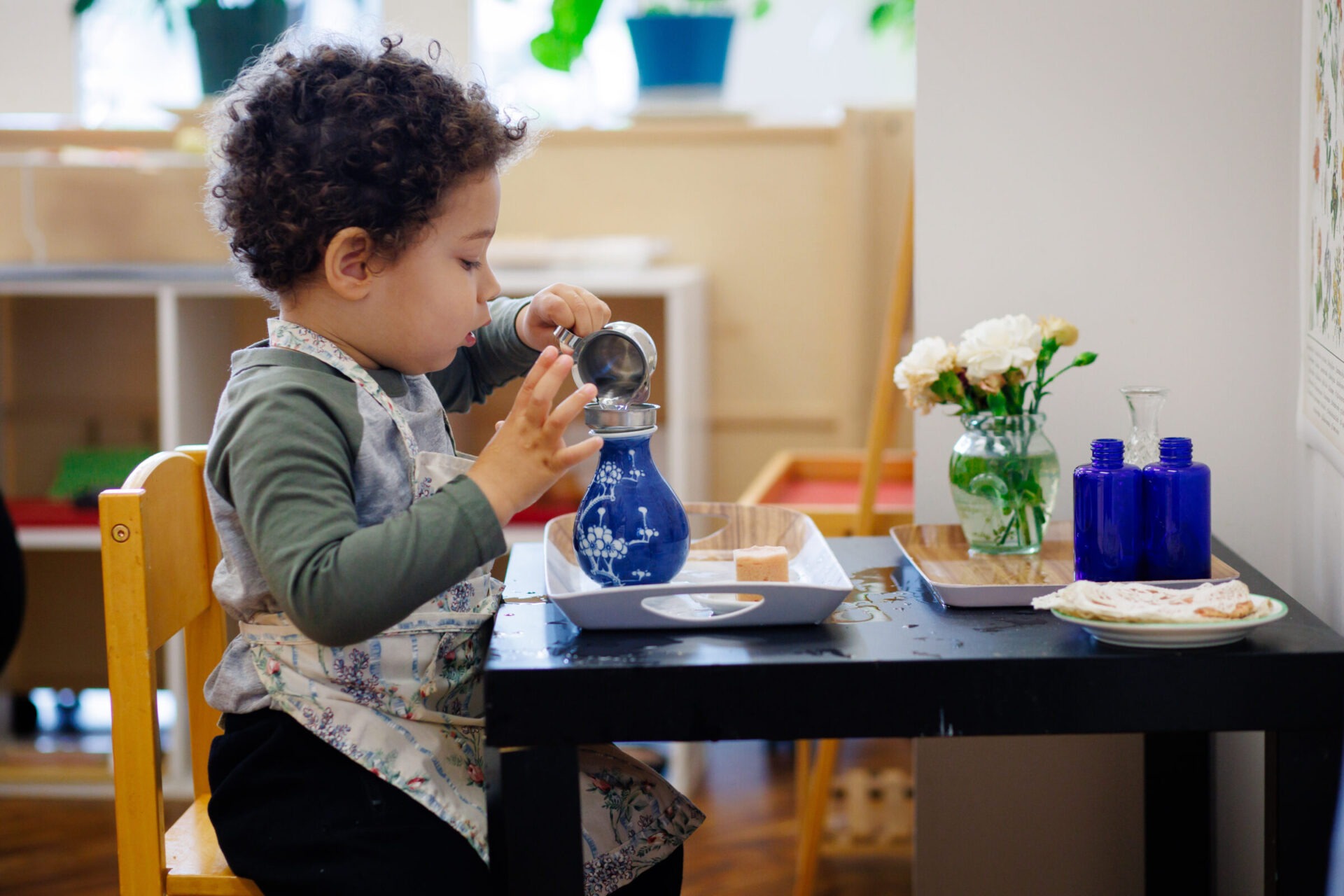
Montessori classrooms are full of beautifully crafted materials that invite exploration. Dr. Maria Montessori understood that learning is most effective when it engages the hands; she famously said, “What the hand does, the mind remembers.” Montessori materials were designed to foster self-discovery, allowing children to learn at their own pace through direct experience. The article describes how activities like washing a table or building the Pink Tower teach precision of movement and mathematical concepts simultaneously. Such hands-on experiences are at the heart of Montessori education's benefits for children, promoting not just academic understanding but also practical life skills and a sense of independence.
In the Montessori School of Wellington’s classrooms, you will see children measuring ingredients to bake bread, transferring water with spoons, and arranging geometric shapes. These tasks refine fine motor skills, encourage curiosity, and develop concentration. The use of real tools and materials teaches children that their work has meaning and purpose, fostering a sense of responsibility and accomplishment. When your child can touch, manipulate, and explore objects, they internalize concepts like size, weight, and texture in a tangible way. This tactile experience fosters creativity because it allows children to approach problems from multiple angles, experiment with solutions, and develop a deeper understanding rather than passively receiving information. Through these engaging activities, children develop a love for learning and a strong foundation for future academic and personal success.
Strengthen Executive Function & Life Skills
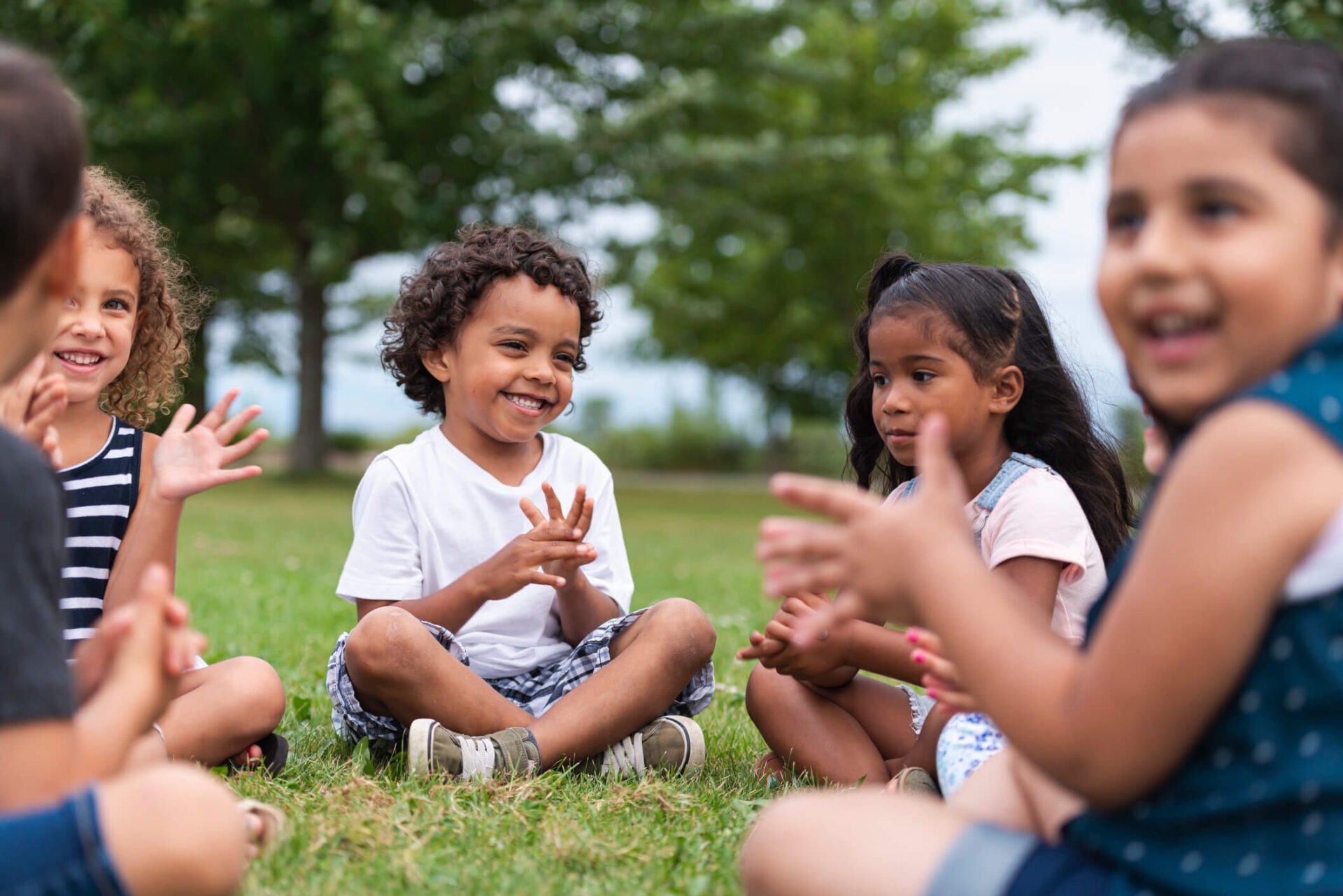
Executive functions like planning, organizing, working memory, and self‑control are crucial for success. In Montessori classrooms, children practice these skills every day. They select work, gather materials, complete multi‑step tasks, and clean up afterwards. According to research summarized in the Bloomsbury Handbook of Montessori Education, Montessori education supports executive function development by offering regular opportunities to practice, scaffolding skills, emphasizing socio‑emotional learning, and providing student choice and active learning experiences. This structure is another key Montessori education benefit for children.
Carefully prepared environments and activities help children develop planning, organization, and self‑control. Because students choose their own work, they must plan their time and manage materials responsibly. This daily practice strengthens neural pathways associated with executive functioning. When children carry out tasks like organizing classroom materials or planning a project, they learn to sequence actions and anticipate outcomes, skills that are transferable to academic subjects and everyday life.
Practical life lessons such as sweeping, pouring, or buttoning, reinforce these abilities. At Montessori School of Wellington, guides carefully demonstrate each step and then allow children to repeat the activity until they master it. This approach builds perseverance because students learn to correct their own mistakes rather than expecting an adult to intervene. Montessori students have a healthier relationship with making mistakes because the environment encourages learning from errors. This willingness to try, fail, and try again promotes self‑confidence and resilience.
Inspire Intrinsic Motivation & Love Of Learning
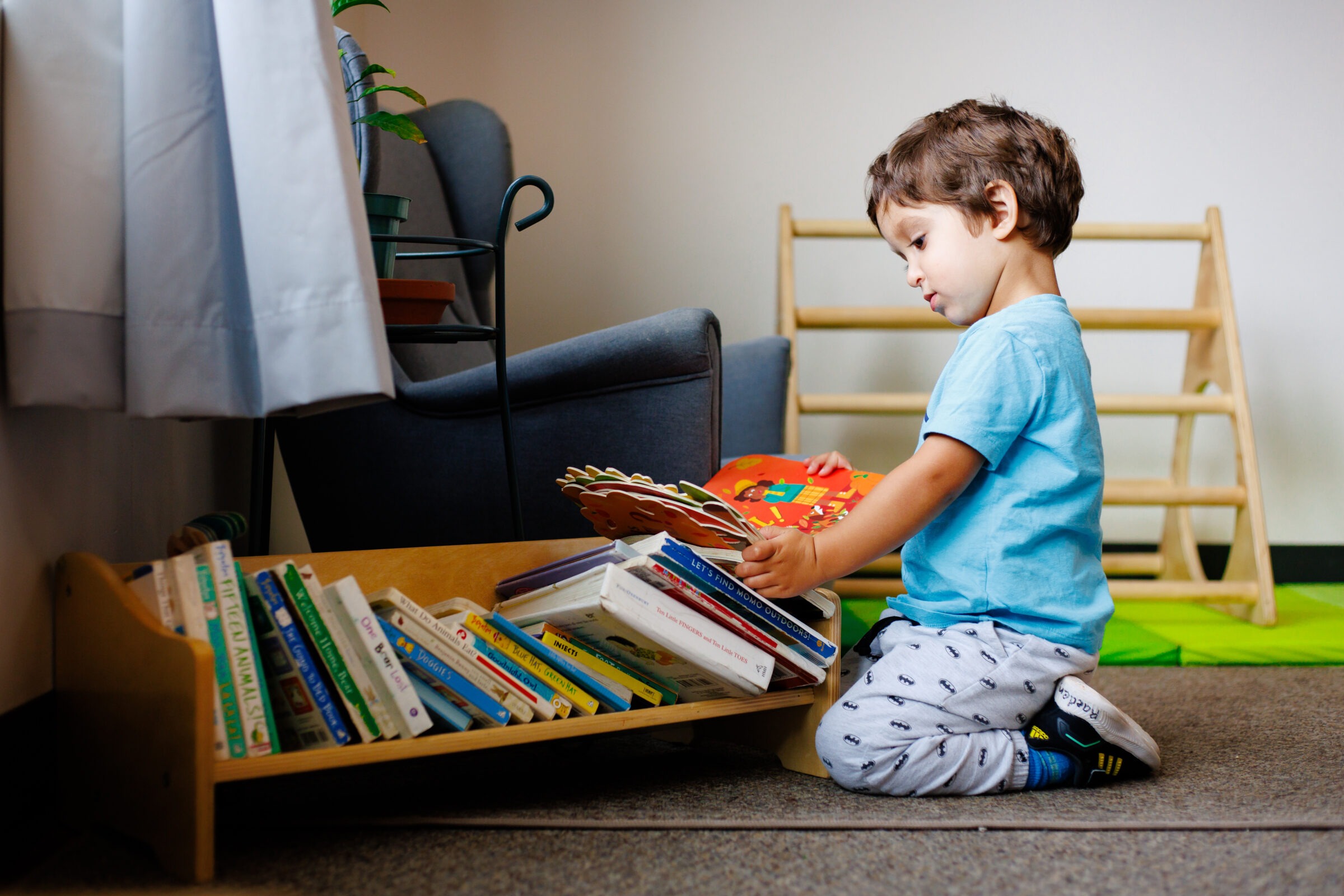
In contrast to systems that rely on external rewards and grades, Montessori education seeks to nurture intrinsic motivation. Children learn because they find joy in the process, not because they expect praise. Montessori practices align with theories of intrinsic motivation by emphasizing autonomy, competence, and relatedness. Students have the freedom to choose tasks (autonomy), work with materials that provide immediate feedback (competence), and collaborate with peers (relatedness). These elements together create a deep love of learning; another major Montessori education benefit for children.
In your child’s daily life, this might look like a four‑year‑old repeating a bead stringing activity until the pattern feels satisfying or a six‑year‑old copying words out of genuine curiosity about spelling. The absence of competitive grading means children focus on their own progress. Montessori classrooms turn learning into a joyful and rewarding experience by tapping into a child’s natural curiosity. When learning is joyful, children are more likely to stick with difficult tasks and develop a lifelong interest in exploration.
Montessori School of Wellington’s family‑run heritage means lessons are taught by people who have seen multiple generations of students grow. Guides share real‑world stories to connect lessons with life. Because the environment remains consistent and nurturing, your child feels secure enough to take intellectual risks. This trust fosters a mindset of continuous improvement rather than simply striving for external recognition.
Improve Academic & Cognitive Outcomes

Montessori education positively affects academic outcomes, including math, language, and general academic ability. Montessori education is generally more effective than traditional methods in developing cognitive abilities, social skills, creativity, motor skills, and academic achievement. Montessori education benefits for children are not limited to social or emotional growth; they also extend to measurable academic gains.
Montessori materials isolate specific concepts and allow students to progress from concrete to abstract understanding. For example, golden bead chains help children visualize decimal quantities before working with numbers on paper. Phonetic word cards allow children to move from sound games to reading. Because each material offers built‑in control of error, students can self‑correct without adult intervention. This fosters a deeper understanding of the subject matter.
Montessori students also develop strong language skills through storytelling, conversations, and reading aloud. Mixed‑age groups encourage older children to model vocabulary and grammar for younger peers. When your child talks through tasks and explains concepts to others, they consolidate their own learning. The research cited earlier shows that Montessori children demonstrate greater creativity and problem‑solving abilities, which are crucial for academic success. By focusing on mastery rather than memorization, Montessori prepares children to think critically and apply knowledge beyond the classroom.
Engage Multi‑Sensory & Physical Development

A hallmark of Montessori education is its emphasis on multi‑sensory learning. Hands‑on learning engages all of a child’s senses, leading to a more comprehensive understanding of the world. Children learn to analyze objects by how they look, feel, smell, taste, and sound. Such sensory experiences are an integral part of Montessori education benefits for children because they support cognitive growth and sensory integration.
Fine and gross motor skills develop through purposeful movement. Young children use their fingers to pinch seeds when gardening, polish silver to develop wrist strength, or carry trays across the room to refine balance. Manipulating objects builds neural connections and motor skills. Because activities are carefully sequenced, children gradually build strength and coordination. For example, carrying the Brown Stair pieces increases in difficulty as the pieces become heavier, while also teaching visual discrimination of size.
Outdoor time is equally important. Montessori School of Wellington maintains outdoor environments where children care for plants, dig in the soil, and observe wildlife. These activities support sensory integration and physical health. When children use their bodies to learn, they develop healthy habits and a deeper appreciation for nature. Multi‑sensory learning ensures your child’s mind and body grow together.
Build Cultural Awareness & Global Perspective
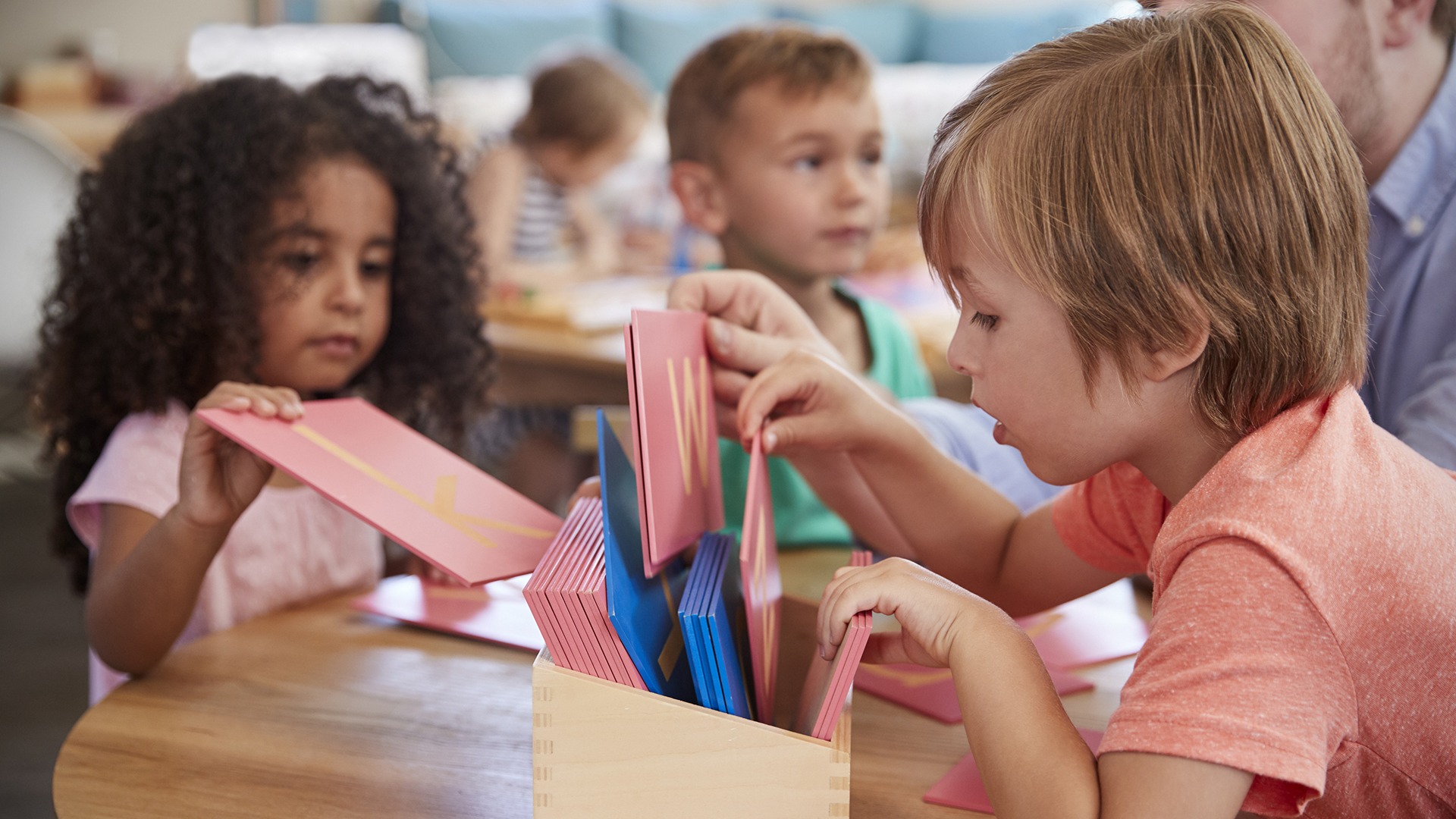
In an increasingly interconnected world, cultivating global understanding and appreciation for diverse cultures in children is not merely beneficial but essential. Montessori education places a profound emphasis on this critical aspect of development, preparing children to thrive as empathetic and responsible global citizens.
Montessori classrooms are dynamic environments where global understanding is woven into the very fabric of daily learning. Through a rich tapestry of hands-on materials, captivating storytelling, in-depth research projects, and joyful celebrations of different cultures, children are guided to develop a comprehensive global mindset. Interactive lessons transport them to ancient civilizations, exploring their histories, artistic expressions, and societal structures. Geography comes alive as children meticulously study maps, learn about various ecosystems, and understand the intricate connections between human societies and their environments. By immersing themselves in the customs and traditions of diverse peoples, children learn to not only respect differences but also to discover the fundamental commonalities that bind humanity. This global perspective is a cornerstone benefit of Montessori education, equipping children with the tools and attitudes necessary to navigate and contribute positively to a multicultural society.
At the elementary level, Montessori’s Cosmic Education curriculum expands this global understanding to an even grander scale, encouraging students to perceive themselves as integral parts of a larger, interconnected universe. This comprehensive curriculum takes children on an awe-inspiring journey through vast timelines of life, from the origins of the universe to the unfolding of human history. Through engaging activities and scientific exploration, they develop a profound sense of awe and wonder for the natural world and a deep sense of responsibility for the planet.
Beyond theoretical understanding, Cosmic Education translates into practical action. Children actively engage in community service initiatives and environmental stewardship projects, understanding that their individual actions have a ripple effect on the world. At the Montessori School of Wellington, for instance, gardening, recycling programs, and vibrant cultural celebrations are not isolated events but integrated components of daily life. These immersive experiences are instrumental in helping children cultivate empathy, understand the interconnectedness of all living things, and develop a strong sense of stewardship for both their local and global communities. They learn that being a global citizen entails active participation in creating a more sustainable and equitable world.
The global reach of Montessori education underscores its profound impact and widespread acceptance. An international census revealed that more than 15,000 Montessori schools operate in a remarkable 154 countries across all continents. This extensive adoption is a powerful testament to the value that families worldwide place on the Montessori approach. It signifies a global consensus on the effectiveness of this educational philosophy in nurturing well-rounded, compassionate, and intellectually curious individuals. By choosing an accredited Montessori school, parents are not merely selecting an educational institution; they are offering their child an education that aligns with an internationally recognized and time-tested philosophy, preparing them for success in a world that increasingly demands global awareness and intercultural competence. This worldwide network also offers a unique opportunity for cultural exchange and shared learning experiences, further enriching the Montessori journey for every child.
Nurture Patience, Resilience, & Character
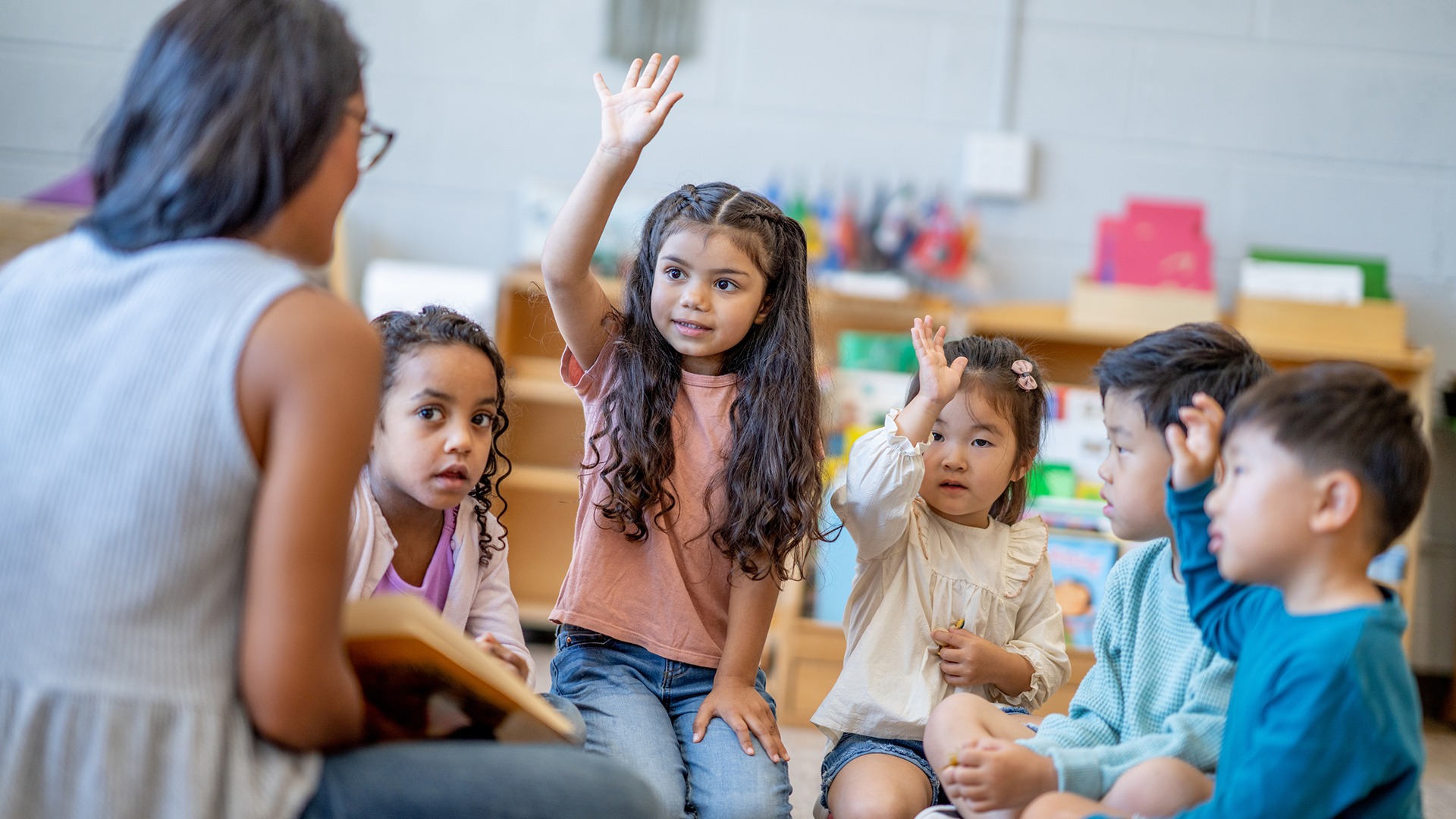
One of the cornerstones of the Montessori philosophy is the cultivation of patience and resilience. These vital character traits are not merely taught but are intricately woven into the fabric of the learning experience, emerging as children consistently encounter and overcome manageable challenges through focused perseverance. The genius of Montessori materials lies in their design, which incorporates built-in "controls of error." This innovative feature empowers children to learn through independent trial and error, fostering a profound sense of self-correction. Instead of relying on external validation or correction, students develop the ability to detect and rectify their own mistakes, leading to a healthier and more constructive relationship with error. This enlightened attitude is instrumental in fostering true resilience; children come to view mistakes not as roadblocks or reasons for surrender, but as invaluable opportunities for deeper learning and growth. Furthermore, a strong sense of patience is organically developed through engaging in long-term, self-directed projects, such as the meticulous completion of a 100-piece bead chain, where the emphasis is on deliberate work rather than rushed outcomes.
The unique structure of mixed-age classrooms further enriches character development. In this dynamic environment, older children naturally step into leadership roles, practicing empathy as they guide and support their younger peers. Simultaneously, younger children cultivate patience by learning to wait for materials to become available or by respectfully asking for assistance. This intergenerational interaction creates a collaborative and supportive community. The pervasive emphasis on grace and courtesy within the Montessori setting actively encourages kindness, respect, and consideration for others. Simple daily activities, such as carefully carrying heavy trays or meticulously rolling mats, teach children to move slowly, deliberately, and with mindful awareness. These seemingly small habits are incredibly powerful in building self-control, fostering an inner sense of calm, and developing a profound awareness of their actions and surroundings.
At the Montessori School of Wellington, the deeply rooted family-owned tradition provides an exceptional foundation for character development. Here, the adult guides consistently model integrity, consistency, and a profound respect for each other and the children. Students grow up in an environment where they consistently witness adults treating each other fairly, working collaboratively, and upholding ethical principles. This pervasive atmosphere nurtures a comprehensive set of character traits that will undoubtedly benefit children throughout their entire lives. These include a strong sense of responsibility for oneself and one's community, unwavering perseverance in the face of challenges, and a genuine commitment to helping and supporting others. These profound qualities, cultivated through the unique Montessori approach, stand as some of the most enduring and invaluable benefits that a Montessori education bestows upon children, shaping them into well-rounded, compassionate, and capable individuals.
Screen‑Free, Real‑World Connections
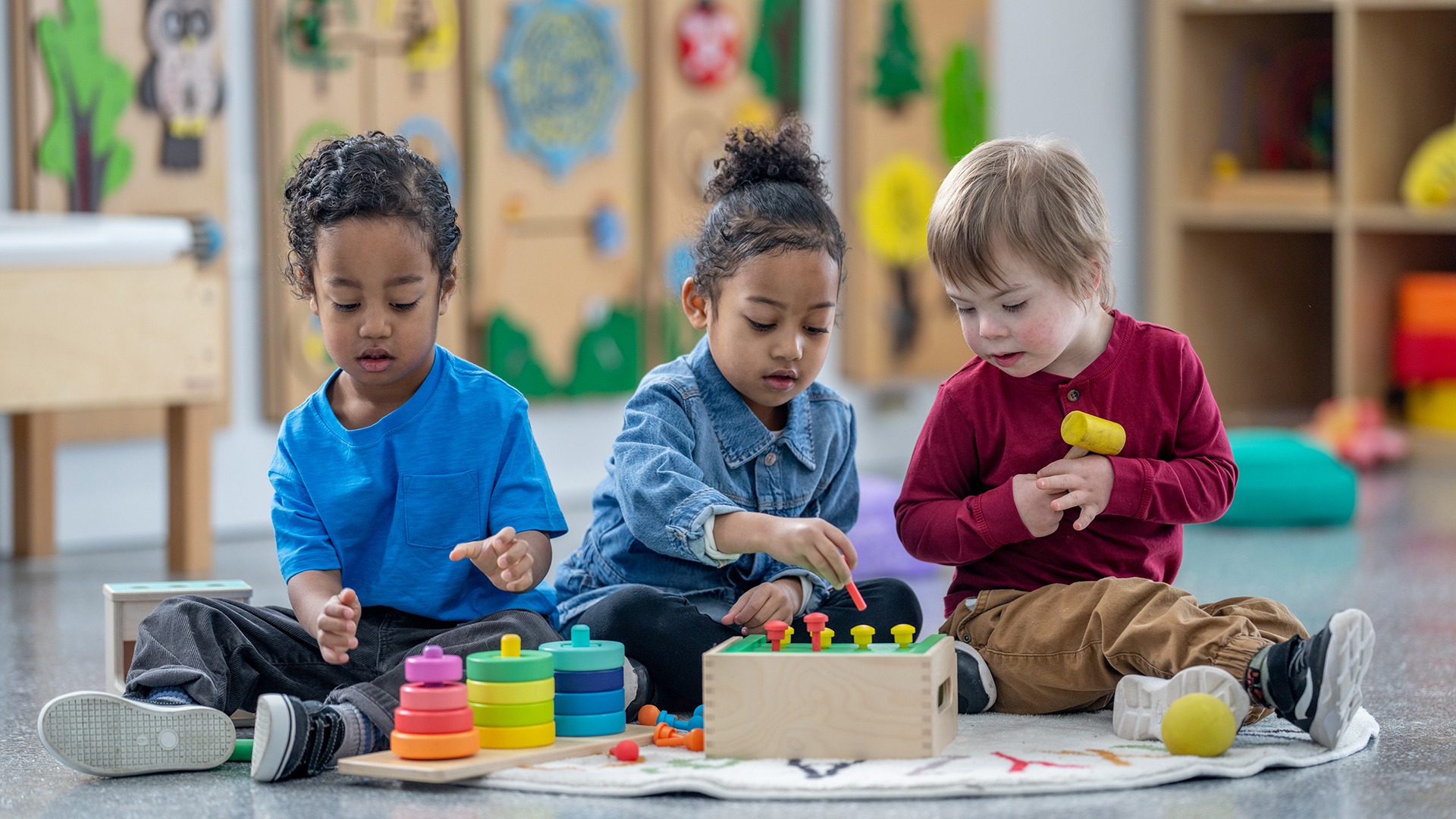
Digital devices are everywhere, and many families worry about the impact of screens on young minds. Montessori classrooms, especially those that are technology-free like the Montessori School of Wellington, offer a refreshing alternative with numerous benefits. Reduced screen time enhances focus, creativity, and communication, giving children more opportunities for imaginative play and meaningful face-to-face interactions that build empathy and social skills. It also encourages physical activity and outdoor play, which improve overall health, mood, and cognitive function. Removing digital distractions helps with hands-on learning for preschoolers in Montessori, encouraging children to explore their creativity, and experience greater emotional well-being—a true foundation for balanced growth and lifelong learning.
Montessori School of Wellington intentionally keeps classrooms free of screens. Children read books, work with hands‑on materials, and participate in outdoor activities. By embracing a back‑to‑basics approach, the school fosters genuine connections with people and nature. For families seeking Montessori education benefits for children, a technology‑free environment ensures that your child’s senses and imagination are engaged fully without digital distraction.
Interested in giving your child the benefits of a technology-free Montessori education? Get in touch today to learn more about our programs and philosophy. We’d love to help you start your child’s Montessori journey!
Summary
Montessori education benefits for children span independence, social and emotional growth, creativity, executive function, intrinsic motivation, academic achievement, multi‑sensory learning, cultural awareness, character development, and screen‑free connections. Montessori students perform better in cognitive, social, and academic domains, while hands‑on learning for preschoolers in Montessori enhances retention and problem‑solving. Mixed‑age communities nurture empathy and leadership, and screen‑free environments promote cognitive development and emotional well‑being.
In choosing the Montessori School of Wellington, you benefit from the only accredited Montessori program in Wellington County, a family with 30 years of experience, hands‑on classrooms that prepare children for life, and a technology‑free environment that fosters creativity and relationships. To learn how your child can thrive in this environment, Get in touch.
Tags:
